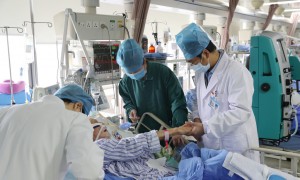Healthcare investments took 5 percent share of investment deals across all sectors in 2015 with an aggregate investment input of 4 trillion yuan. The country's fast growing middle class with higher healthcare demand, has offered more room for the industry to expand further in the future.
Standing up and walking are now easier after 80 years old Chen Hanyuan started training at this new elderly rehab center.
"I used to fall down very often. It’s not the case anymore thanks to the rehab training. The doctor is patient, she makes me get more involved in the session, which is really interesting," she said.
Like Chen, many seniors in the neighborhood now receive their rehab care here. The facility, opened at the end of last year, was invested by a private insurance firm. And this 300 million investment is one of its eight similar projects nationwide.
"The long-term rehab care is a sector with great potential. The average return is expected to be around 8 to 10 percent in long-term care sector," said Liu Tingjun, directorof Senior Rehab Center.
Thanks to government policies for private sector and foreign enterprises, the growth of healthcare and senior case stepped on a fast track, attracting large amounts of private money.
In January, conglomerate Dalian Wanda group announced its joint venture with British International Hospitals Group, to build three hospitals in Chinese cities.
And according to the country's health authorities, by September 2015, there were 27 thousand hospitals in China. 1,600 were newly added within a year, and all of them are operated privately.
Besides the brick and mortar facilities, capital injection has helped move the healthcare sector online. In this office building, hundred of so called “Internet doctors” are providing online medical consultation.
"All of our doctors here used to work in hospitals. And over half were from big general hospitals. The reason why they are here is they recognize the potential of online and mobile healthcare services," said Xie Hong, chief physician.
This online hospital treats some 20,000 patients in a single day, far exceeding the average of a general hospital.
And nationwide, some 400 mid or large scaled hospitals have joined Internet giant Alibaba’s scheme of building a “future hospital” to extend their services to online patients.
Despite a burst of investment, experts say investing in healthcare sector is no similar to many other businesses. It requires a long term investment strategy.
"In the healthcare industry the return of investment is not something going to happen quickly. The investment should also go with a nature of public interest. So investors should really combine their investment with the thought of serving the public interests," said Li Jiangtao of Tsinghua University.
As the government okayed more reforms to further promote the industry, the market is expected to reach 8 trillion yuan by 2020.
And the expansion could only make millions of Chinese families to meet their increasing healthcare needs that they are eagerly looking forward to now.







